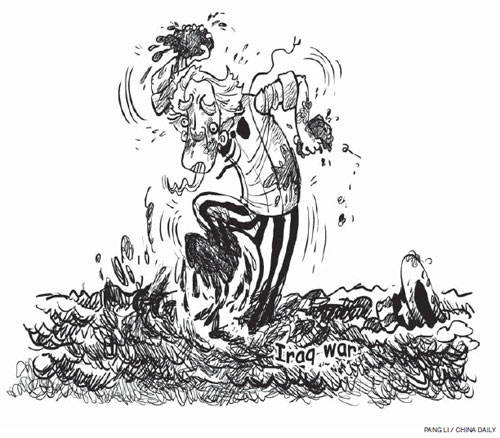Iraq war a bitter lesson for US

On March 20, 2003, former US president George W. Bush joined hands with Tony Blair, then British prime minister, to invade Iraq without declaring a war, saying that Saddam Hussein possessed weapons of mass destruction and was harboring al-Qaida.
Although the US-led coalition overthrew Saddam Hussein, it got entangled in a long "counter-terrorism" and "counter-insurgency" war that not only claimed tens of thousands of innocent Iraqis' lives, but also eroded US hegemony. It was left to Bush's successor Barack Obama to get the US out of the mess by withdrawing American troops from Iraq by the end of 2011.
By wantonly demonizing Saddam Hussein and waging an unjust war against Iraq, the US wanted to dominate the Middle East and consolidate its hegemony over the world. Colin Powell, then US secretary of state, even gave false testimony before the UN Security Council and presented fake "evidence" to prove Iraq had unconventional weapons in an attempt to get the council's authorization to launch an attack on Iraq.
After failing to obtain the approval, the US-led coalition bypassed the Security Council and launched an all-out war against a sovereign state on the pretext of "liberating" its people from a "tyrant". The US action was a blatant violation of the UN Charter and the norms governing international relations, and had repercussions across the face of the globe. It was clear right from the beginning that the US invasion of Iraq was not for the "liberation" of Iraq but to consolidate American hegemony.
After the Sept 11, 2001, attacks, the US used its might as the only superpower (and to a lesser degree the sympathy of the international community) to launch a war in Afghanistan at the end of 2001.
But instead of withdrawing from Afghanistan after ousting the Taliban from power, Washington broadened the scope of its "war on terror" by trying to orchestrate a "democratic" transformation in the Islamic world, labeling some countries as "axis of evil" and pursuing unilateralism in international relations. In the process, the US extended the "war on terror" to Iraq.
The US-led invasion of Iraq resulted in mass civilian casualties and huge economic loss, leaving the country in tatters and fuelling bloody sectarian violence that gave birth to a new faction of al-Qaida in a country where it never had any base. The blame for this mayhem and chaos rests squarely on US shoulders.
The Iraq war (along with that in Afghanistan) has also had strategic implications on international relations.
First, it signaled the decline of US hegemony. Along with the US-led "war on terror" and the Afghanistan war, the Iraq war led to a sharp increase in US military spending that put the federal government under heavy debt and indirectly triggered the 2008 financial crisis. The highly expensive Iraq war is also closely related to the "fiscal cliff" and debt crisis facing the US today.
Second, the two wars indirectly accelerated the multi-polarization process in international relations, allowing emerging powers to come into the limelight. The two wars and the "war on terror" have greatly denuded the US of its strategic resources and eroded its "sole superpower" status.
As a result, the Obama administration has made extensive changes in its foreign policy by ending the "war on terror", withdrawing US troops from Iraq, speeding up the withdrawal from Afghanistan and shifting its strategic focus to the burgeoning Asia-Pacific region. The US has also begun using smart power in greater measure in its foreign affairs.
Third, the war in Iraq broke the existing balance of power in the Middle East, especially that between Iraq and Iran. It changed the political landscape of and severely weakened Iraq, leaving Iran, which the US considers its "enemy No 1" to become stronger. The rise of pro-Iran Shiites to power in Iraq has been favorable to Iran and detrimental to US interests, which is a bitter irony of history.
The Iraq war has been more than a lesson for the international community.
An important reason why the US could wage wars in two countries was the serious imbalance of power that prevailed in the world a decade ago. Had global checks and balances been in place, the US could not have had its way.
Now that the global financial crisis and the emergence of BRICS have checked the marauding policies of Washington and brought about some sanity in the global power balance, the US-led West can no longer continue its hegemonic policies. Hegemonism and wars of aggression, no matter how high-sounding they are made out to be, are doomed to fail.
Only with the authorization of the UN Security Council can a country (or a group of countries) exercise the right to intervene in another. Countries that pursue unilateral intervention violate international law.
Toward the end of 2010, some North African and Middle East countries experienced political upheavals. One among them, the Syrian civil war, is still on. Some Western powers are eager to seize the opportunity to "intervene" in the country and have stepped up efforts to arm Syrian opposition forces in an attempt to overthrow the Bashar al-Assad government and minimize Iran's influence in the region.
The security situation in the Middle East has become increasingly sinister, which should remind the Western powers of the painful lessons of the Iraq war. If they ignore that lesson, they will end up shooting themselves in the foot.
The author is deputy director of World Politics Research Institute, affiliated to the China Institutes of Contemporary International Relations.


















